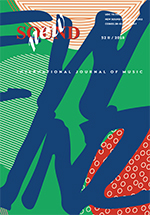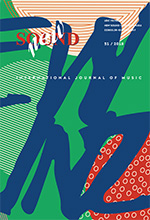Issue No. 39
Composer Speaks
Ivana Miladinović Prica – A SKETCH OF THE (SELF-)PORTRAIT OF IVAN BRKLJAČIĆ
Download: ser / eng
Studies
Andrija Filipović – NOISE AND NOISE: THE MICROPOLITICS OF SOUND IN EVERYDAY LIFE
Abstract: This paper deals with the issues of possible relationships between the categories of exteriority and interiority in the soundscape of contemporary city life. The aim is to try and map complex relationships between these categories and to show how they are maintained in everyday life through the micropolitics of sound, especially during listening to the quotidian noise of a city and noise music.
Keywords: noise, noise, micropolitics, everyday life, Deleuze, Guattari, exteriority, interiority.
Download: ser / eng
Valentina Radoman – ON COMPARATIVE RESEARCH IN MUSICOLOGY: PERIPHERAL VS. CENTRAL EUROPEAN MUSICAL CULTURE AND THE MUSICOLOGICAL COMPARATIVE APPROACH IN THE 20TH CENTURY
Abstract: The paper considers some of the key issues referring to the comparative research in musicology. Contrary to the science of literature, in which comparative studies have been autonomous for a long time, such is not the case in musicology. So far, musicological comparative research has not established itself as a field with distinctly defined aims, roads and development methods, nor has it been provided with adequate terminology. It may be claimed that comparative studies have been omitted from musicological research because of an idea prevailing in the second half of the 19th century and later on, during the first half of the 20th century, based on the fact that musical art itself was specific – special in comparison with other arts and autonomous from an extra-artistic context. This is why the comparative approach in musical art may have often been understood as a comparison of exclusive – to say it in Hanslick’s words – tonally moving forms (or the art of tones) which does not and should not have any other purpose except the comparison of one tonally moving form with another one. In contrast to such a conception, this paper considers the role of political-ideological incentives to the emergence and development of comparative research. It includes the reference points of a comparative musicological narrative, namely those types of musicological comparisons analyzing the works of com- posers belonging to differently located European musical cultures – peripheral and central ones. In view of the fact that in the 20th century such comparisons were mostly performed through a stylistic analysis (perceived as a formal analysis) of works of art, special attention has been devoted to the political-ideological instrumentalization of such analysis. The paper also puts forward the most important questions to which musicological comparative science should provide clear answers in the 21st century.
Keywords: central musical cultures, formal analysis, modernization, musicological comparative approach, peripheral European musical cultures, stylistic analysis.
Download: ser / eng
Mirjana Veselinović-Hofman – THE NATURE OF POST-MODERN CLASSICALITY IN EUROPEAN MUSIC
Abstract: This text examines the difference between manifestations of the classical in post-modernism, considered in the broader sense of the word when hyphenated, and post-modernism in the narrower sense when written without the hyphen.The classical in post- modernism manifested itself in neoclassicism as a compositional-technical and aesthetic category, and in the form of postmodern classicality. A postmodern composition can reference classicality whenever it is based on the play of classical signifiers according to any of the possibilities examined in this article: 1) when classical/neoclassical musical materials ‘respond’ to classical procedural signifiers; 2) when classically referenced materials are subjected to non-classical procedures; 3) when non-classically referenced materials are subjected to classical procedures.
Keywords: post-modernism, neoclassicism, postmodern neoclassicism, postmodernism, postmodern classicality.
Download: ser / eng
Mirjana Zakić
Danka Lajić-Mihajlović – (RE)CREATING THE (FOLK MUSIC) TRADITION: THE NATIONAL COMPETITION OF BRASS ORCHESTRAS AT THE DRAGAČEVO TRUMPET FESTIVAL
Abstract: This paper deals with the problem of the treatment of traditional music at the Dragačevo Trumpet Festival, one of the most important folk music festivals in Serbia. In over half a century of its existence, the Festival has developed from a local event into an international spectacle with a programme scheme which reflects the growing tendency towards multiculturalism, also obvious at the national contest, which refers conceptually to the national folk music tradition. The effects of ‘festivalization’ are analysed on the example of the 50th contest (2010), as a paradigm of the modern treatment of the folk music tradition at the Festival. The complexity of the web of the Festival’s protagonists (musicians, organizers, the members of the jury, the audience), requires a consideration of the issue through different domains which represent their participation in the (re)creation of tradition.
Keywords: Dragačevo Trumpet Festival, trumpet-playing (in Serbia), competition (of brass orchestras), tradition, reshaping tradition.
Download: ser / eng
New Works
Milan Milojković – ON THE GUARDING OF THE HEART BY ĐURO ŽIVKOVIĆ: ANOTHER VIEW ON THE SYMBIOSIS OF RELIGION, STATE AND MUSIC
Abstract: On the guarding of the Heart, is an ‘instrumental cantata’ by Đuro Živković, performed at the 20th International Review of Composers in Belgrade, by the ensemble Klangforum Wien. This „spiritual“ composition, as Živković describes it, is connected to Philokalia, a collection of Orthodox texts assembled in the 18th century around the idea of ‘love for beauty’. By linking his compositional actions to the Church and large, impor- tant traditions – and today, when the rawness of all these ideas clashes with both the recent past and the actual crisis – Živković offers a Utopia of new stability and order that, within the social chaos, can be found only in society’s ‘antipode’: the individual. However, since a work of art is a phenomenon whose ‘ontological’ and ‘phenomenological’ foundation relies on institutional support and social engagement, it stems from the place it occupies in a society’s production structure. Thus, the knowledge on ‘the guarding of the heart’ comes from a composer who mastered the technique, and is not likely to use all of those fantasies to snap the audience out of their lethargy and confront them with the current problems. On the contrary, by eliminating uncertainty he induces us to ‘descend’ some- where where ‘eternity’ overpowers current problems, and that place he calls ‘the heart’ of ‘the spiritual’.
Keywords: The International Review of Composers, spiritual music, contemporary music, Orthodoxy, society, production.
Download: ser / eng
Analyses
Gregor Pompe – PALIMPSEST AND/OR PARODY TECHNIQUE: THE RELATION BETWEEN MODERNISM AND POSTMODERNISM IN PETER RUZICKA’S COMPOSITION TALLIS
Download: ser / eng
Festivals and Symposia
Stefan Cvetković – 20TH INTERNATIONAL REVIEW OF COMPOSERS Belgrade, 11–14 November 2011
Download: ser / eng
Stefan Cvetković – КоMA ‘8
Download: ser / eng
Milan Milojković – BELGRADE JAZZ FESTIVAL 27–30 October 2011
Download: ser / eng
Marija Dumnić – Ana Hofman, Staging Socialist Femininity:
Gender Politics and Folklore Performance in Serbia, Brill, Leiden – Boston, 2011, pp. XXI+148
Download: ser / eng
Defended Theses
Rastko Jakovljević – MARGINALITY AND CULTURAL IDENTITIES: LOCATING THE BAGPIPE MUSIC OF SERBIA
Download: ser / eng


